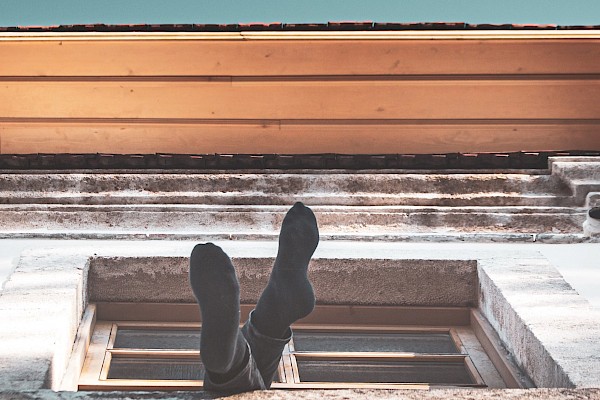Successfully coping with quarantine
Sport and exercise at homeRight now many roads lead to quarantine. In Switzerland, you must quarantine for 10 days if you have been in close contact with someone who has tested positive for the coronavirus, or have returned home from a trip to a state or region with a high risk of infection. These measures have been ordered by the Federal Government due to the Covid-19 pandemic, and are extremely important for protecting physical health and containing the coronavirus. But how do isolation and movement restrictions during quarantine affect our mental health? And what strategies could help us to cope with quarantine successfully?
The psychological consequences of corona quarantine
A research group at King’s College London examined existing scientific work on the subject in a rapid review in early 2020. Of a total of 3166 studies, they filtered out the 24 most relevant and discussed them in an article published in March in the medical journal The Lancet.
Human beings are social creatures and time spent in quarantine is rarely a pleasant experience for us. Quarantine means spending 10 days away from our nearest and dearest, not having any freedom, uncertainty as to whether or not we are infected, and frustration and boredom. In their article, the scientists further indicate that the duration of quarantine, inadequate healthcare and a lack of information from public health bodies make a period of quarantine even more stressful. The researchers named psychological disorders such as fear, sleep disorders, depression and posttraumatic stress disorder (PTSD) as possible consequences of quarantine.
So that it does not come to this, there are various strategies that will help you to make it through the period of quarantine successfully.
Successfully coping with quarantine
Here in Switzerland, quarantine lasts for 10 days. You will spend this time within your own four walls. You can get fresh air and a few rays of sun exclusively on your balcony, in your garden or through the window. No walks beside the lake, no sport in the open air, no convivial coffee with friends in town and no shopping in the nearby supermarket. 10 days alone at home. This state of affairs is already enough to lower the mood. We have put together some scientifically substantiated strategies to help you successfully cope with quarantine.
#1: Understanding the motivation to connect: first of all, it is important to understand that it is normal to feel sad and tired. On the other hand, don’t forget that the pandemic is presenting us with specific challenges and dealing with them is new for all of us. We humans are naturally social beings, which is why physical distance from our nearest and dearest during quarantine is particularly hard. When danger is imminent, we are motivated to make connections. This means that we seek closeness with other people at such times, coming together in groups and communities, so we can keep each other safe. One of the most effective measures against the corona pandemic is physical distance, which runs counter to this natural, biological instinct. Distancing consequently leads to human discomfort and ill health. During quarantine, therefore, it is entirely normal to feel unwell, or sad.
#2: Meet virtually with people as much as you can: associated with the above phenomenon, various studies of the work context show that those of us who spend their work breaks with other people feel less stressed. Time spent with others demonstrably reduces negative emotions. During quarantine, seek out contact with others, be it virtual breaks with your team when working from home, or video calls with friends and family members. Instead of cancelling meetings with friends because you are in quarantine, just meet virtually for a coffee instead.
#3: Get involved in familiar things in a new way: if you can’t be with other people, find consolation in the familiar. Recent scientific findings indicate that specific activities can satisfy the need to be with other people. Binge-watching your favourite series, listening to your favourite music or playing classic games can be comforting, because you are familiar with them, and they can positively reinforce the feeling of “being with old friends”.
#4: Regulate your perception: you probably know the saying “I’ll believe it when I see it”. Scientists have discovered that the reverse – you see what you believe – could be just as true. Studies show that conviction affects how we perceive and interpret information. Emotions, for example, affect our perception in this way. People who tend to be in a positive mood interpret different information in a positive way for that reason. What does this mean for time spent in quarantine? Pay attention to your mood and remember that things are mostly not as bad as you might think. Namely, it is possible that your fears or worries result from you perceiving and interpreting things more negatively than they actually are. Pay attention to the positive, and you will see that your perception changes and your mood improves.
“Our brains tick like Google: change the question and the results are completely different.”
(Bahar Yilmaz)
#5: Allow yourself breaks: time in quarantine can become monotonous. Every day is the same as every other day and they frequently seem to go on forever. Therefore, make a point of taking regular breaks, so your body and brain can recover. Give your head some time out and don’t spend your break on your smartphone or in front of the TV. Find ways of switching off at home for a moment. Look out of the window, or take a few deep breaths in the garden, on the balcony or by the window. This can help you to pause for a moment and recharge your energy.
#6: Move: space can be very limited during 10 days of quarantine, depending on your housing conditions. Your range of movement is reduced to a minimum and frequently it is also impossible to do your usual sporting activities. This circumstance is not good for the mood. Physical activity, movement and sport have a positive effect on our moods. That is why you should try to keep physically active as much as possible and to exercise during quarantine. Various home workouts are very suitable for this. In our article “Sport and exercise at home”, you will find plenty of links and ideas for home workouts. You can find different yoga classes here.
In quarantine with children and working from home? Don’t worry. In our article “Job and family – how can I juggle everything?” (https://www.psgz.ch/news/home-office-und-familie-managen/), you will find useful tips and a great many links.
References:
Brooks, S. K., Webster, R. K., Smith, L. E., Woodland, L., Wessely, S., Greenberg, N. & Rubin, G. J. (2020). The psychological impact of quarantine and how to reduce it: rapid review of the evidence. The Lancet, 395 (10227), 912–920.
Dezecache, G., Frith, C. D. & Deroy, O. (2020). Pandemics and the great evolutionary mismatch. Current Biology Magazine. 30, R417-R429.
Kim, S., Park, Y. & Niu, Q. (2017). Microbreak activities at work to recover from daily work demands. Journal of Organizational Behavior, 38, 28-44.
Paravati, E., Naidu, E. & Gabriel, S. (2020). From «love actually» to love, actually: The sociometer takes every kind of fuel. Journal of Self and Identity. University College London. (2008). How Believing Can Be Seeing: Context Dictates What We Believe We See. ScienceDaily.
 subscribe to newsletter
subscribe to newsletter


